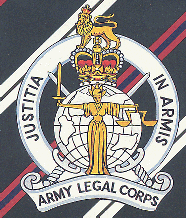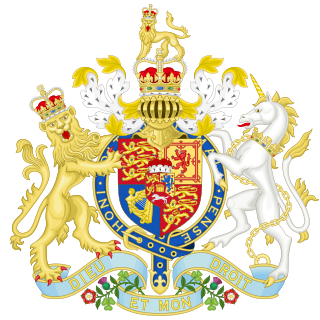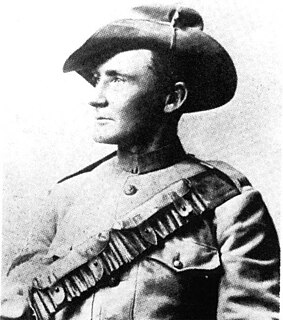 W
WThe Allied Forces Act 1940 was an act of Parliament of the Parliament of the United Kingdom passed in late 1940, after the fall of France.
 W
WThe Armed Forces Act 2006 is an Act of the Parliament of the United Kingdom.
 W
WThe Armed Forces Act 2011 is an Act of the Parliament of the United Kingdom.
 W
WThe Armed Forces Discipline Act 2000 is an Act of the Parliament of the United Kingdom. It amends the Army Act 1955, the Air Force Act 1955 and the Naval Discipline Act 1957 in relation to custody, the right to elect court-martial trial and appeals against findings made or punishments awarded on summary dealing or summary trial; and for connected purposes.
 W
WThe Army Legal Services Branch (ALS) is a branch of the Adjutant-General's Corps (AGC) in the British Army. Before 1992, the branch existed as the independent Army Legal Corps (ALC).
 W
WThe Biological Weapons Act 1974 is an Act of the Parliament of the United Kingdom, passed during the reign of Queen Elizabeth II on 8 February 1974, with the long title "An Act to prohibit the development, production, acquisition and possession of certain biological agents and toxins and of biological weapons."
 W
WThe Defence of the Realm Act 1803 was an Act of the Parliament of the United Kingdom. The Act was bought before the House of Commons on 18 May 1803 by Charles Philip Yorke, then Secretary at War in the Addington ministry. The Act required all counties to a full report on all able-bodied men aged between fifteen and sixty, classifying those in the volunteer regiments, those willing to serve, to drive waggons or act as guides, as well as the details of waggons, boats, horses, cattle, food and forage.
 W
WThe Defence of the Realm Act (DORA) was passed in the United Kingdom on 8 August 1914, four days after it entered the First World War and was added to as the war progressed. It gave the government wide-ranging powers during the war, such as the power to requisition buildings or land needed for the war effort, or to make regulations creating criminal offences.
 W
WThe Defence Reform Act 2014 is an Act of the Parliament of the United Kingdom. It has 51 sections and seven schedules, and is concerned with defence procurement and the UK Reserve Forces, particularly the Territorial Army.
 W
WThe Emergency Powers (Defence) Act 1939 was emergency legislation passed just prior to the outbreak of World War II by the Parliament of the United Kingdom to enable the British Government to take up emergency powers to prosecute the war effectively. It contained clauses giving the government wide powers to create Defence Regulations which regulated almost every aspect of everyday life in the country. Two offences under the regulations were punishable with death.
 W
WThe Foreign Enlistment Act 1870 is an Act of Parliament of the Parliament of the United Kingdom that seeks to regulate mercenary activities of British citizens.
 W
WA glasshouse, or the glasshouse is a military prison in the United Kingdom.
 W
WThe Judge Advocate of the Fleet was an appointed civilian judge who was responsible for the supervision and superintendence of the court martial system in the Royal Navy from 1663 to 2008.
 W
WThe Levy en Masse Act 1803 was an Act of the Parliament of the United Kingdom. Although formally presented as an amendment of the Defence of the Realm Act 1803, it was actually a major piece of new legislation as it required counties in Great Britain to draw up lists of men for military training and detailed how compulsory training would take place. However, the Act included clauses that military training could be suspended if sufficient numbers of men joined volunteer corps, and the huge increase in their number in response to the Act meant that compulsory military training was never used.
 W
WThe Military Service Act 1916 was an Act passed by the Parliament of the United Kingdom during the First World War.
 W
WThe Militia (Ireland) Act 1802 was an Act of Parliament of the United Kingdom affecting the Militia, a locally raised force for home defence. It applied only to the Kingdom of Ireland, with the Militia Act 1802 and Militia (Scotland) Act 1802 applying elsewhere in the country.
 W
WThe Militia (Scotland) Act 1802 was an Act of Parliament of the United Kingdom affecting the Militia, a locally raised force for home defence. It applied to Scotland while there were other acts of the same year applying to England and Wales, and to Ireland.
 W
WThe Militia (Stannaries) Act 1802 was an Act of Parliament of the United Kingdom affecting the Militia, a locally raised force for home defence. It applied only to the Stannaries of south-western England, and extended the provisions of the main Militia Act 1802 to these jurisdictions.
 W
WThe Militia Act 1802 was an Act of Parliament of the United Kingdom affecting the Militia, a locally raised force for home defence. It applied to England and Wales, with Scotland covered by the Militia (Scotland) Act 1802, and Ireland by the Militia (Ireland) Act 1802. Subsidiary acts dealt with the City of London, the Cinque Ports, and the Stannaries, which had special legal requirements.
 W
WThe National Service Act 1948 was an Act of Parliament which extended the British conscription of the Second World War long after the war-time need for it had expired, in the form of "National Service". After a bill with the same purpose had been approved in 1947, expected to be implemented 1 January 1949, the Cold War and the Malayan Emergency caused a revised and extended version of the new legislation to be approved in December 1948, only days before the new arrangements came into force.
 W
WThe Naval Defence Act 1889 was an Act of the Parliament of the United Kingdom. It received the Royal Assent on 31 May 1889 and formally adopted "two-power standard" and increased the United Kingdom's naval strength. The standard called for the Royal Navy to maintain a number of battleships at least equal to the combined strength of the next two largest navies in the world, which then were France and Russia. An extra £20 million over the following four years were provided for ten new battleships, thirty-eight new cruisers, eighteen new torpedo boats and four new fast gunboats. The two-power standard was maintained until disarmament began during the inter-war period.
 W
WThe Naval Discipline Act 1957 was an Act of the Parliament of the United Kingdom governing discipline in the Royal Navy. It governed courts-martial and criminal penalties for crimes committed by officers and ratings of the Royal Navy. It was substantially replaced at the end of 2008 by the Armed Forces Act 2006, which created a unified code of military law for all three British Armed Forces. The whole Naval Discipline Act was repealed in October 2009.
 W
WPardons for Morant, Handcock and Witton, three Australian soldiers, were sought from their convictions for war crimes - the murder of several Boer prisoners-of-war - during the Second Boer War.
 W
WThe Reserve Forces Act 1899 was an Act of Parliament of the Parliament of the United Kingdom. It allowed reservists of the British Army to reside outside the United Kingdom, and to be discharged to the reserve without having to return home.
 W
WThe Reserve Forces Act 1937 was an Act of Parliament of the Parliament of the United Kingdom. It allowed "Class A" British Army reservists to be called up for active service during their first five years after leaving the Army.
 W
WThe Service Prosecuting Authority (SPA) is the organisation within the Ministry of Defence, responsible for consideration of cases referred to it by the Service Police and where appropriate the Military Chain of command and where necessary the directing and prosecuting of those cases at Courts Martial worldwide and in the Service Civilian Court. Furthermore, it acts as respondent in the Summary Appeal Court and represents the Crown in the Courts Martial Appeal Court (CMAC).
 W
WThe Territorial and Reserve Forces Act 1907 was an Act of the Parliament of the United Kingdom that reformed the auxiliary forces of the British Army by transferring existing Volunteer and Yeomanry units into a new Territorial Force (TF); and disbanding the Militia to form a new Special Reserve of the Regular Army. This reorganisation formed a major part of the Haldane Reforms, named after the creator of the Act, Richard Haldane.
 W
WThe Territorial Army and Militia Act 1921 was an Act of Parliament of the Parliament of the United Kingdom affecting the reserves of the British Army It modified the Territorial and Reserve Forces Act 1907, renaming the existing Territorial Force as the "Territorial Army" and the Special Reserve as the "Militia", and updated or repealed a number of outdated regulations.
 W
WThe Visiting Forces Act 1952 is an Act of the Parliament of the United Kingdom.
 W
WThe War Damage Act 1965 is an Act of United Kingdom Parliament which exempts the Crown from liability in respect of damage to, or destruction of, property caused by acts lawfully done by the Crown during, or in contemplation of the outbreak of, a war in which it is engaged. Enacted in the aftermath of the prominent case Burmah Oil Co. v Lord Advocate, it is a rare piece of British legislation with retroactive effect.
 W
WThe Wills Act 1837 is an Act of the Parliament of the United Kingdom that confirms the power of every adult to dispose of their real and personal property, whether they are the outright owner or a beneficiary under a trust, by will on their death (s.3). The act extends to all testamentary dispositions or gifts, where "a person makes a disposition of his property to take effect after his decease, and which is in its own nature ambulatory and revocable during his life." As of 2012, much of it remains in force in England and Wales.
 W
WThe Yeomanry (Ireland) Act 1802 was an Act of Parliament of the United Kingdom affecting the Yeomanry and Volunteers, two of the forces raised in the United Kingdom for home defence. It only covered units in Ireland, with those in England, Wales, and Scotland provided for by the Yeomanry and Volunteers Act 1802.
 W
WThe Yeomanry and Volunteers Act 1802 was an Act of Parliament of the United Kingdom affecting the Yeomanry and Volunteers, two of the forces raised in the United Kingdom for home defence. It only covered units in England, Wales, and Scotland, with Irish units provided for by the Yeomanry (Ireland) Act 1802.